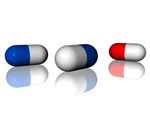August 25, 2014
 A new drug designed to treat Alzheimer’s disease showed mixed results in a mid-stage study designed to test safety and effectiveness. The drug, crenezumab, showed some success in slowing the decline in thinking and memory skills in people in the early stages (mild) of Alzheimer’s but none or very little success in slowing decline in overall functioning. However, patients in the earliest stages of Alzheimer’s did give some indication that their decline in overall functioning was slowed, as well as showing slowed decline in thinking and memory.
A new drug designed to treat Alzheimer’s disease showed mixed results in a mid-stage study designed to test safety and effectiveness. The drug, crenezumab, showed some success in slowing the decline in thinking and memory skills in people in the early stages (mild) of Alzheimer’s but none or very little success in slowing decline in overall functioning. However, patients in the earliest stages of Alzheimer’s did give some indication that their decline in overall functioning was slowed, as well as showing slowed decline in thinking and memory.
Researchers at Roche, the company that makes the drug, are analyzing the data to decide whether to continue studies of the drug in larger numbers of people.
Crenezumab is designed to fight beta-amyloid, the toxic protein that builds up in the brains of people with Alzheimer’s. But like many other drugs aimed at beta-amyloid currently being tested, studies have so far shown limited to no success.
Experts think such drugs may be most effective if given in the earliest stages of Alzheimer’s, before damage to the brain becomes widespread and irreversible. The hope is that such drugs might delay or halt progression of the disease. Currently available Alzheimer’s drugs may ease symptoms for a time but do nothing to stop the relentless progression of disease.
“Data from these phase 2 studies provide valuable information about crenezumab’s potential clinical activity in people with Alzheimer’s disease, where there is a great need for treatment options,” said Richard Scheller of Genentech, a division of Roche. “These findings support the importance of testing potential disease-modifying agents, such as beta amyloid antibodies, early in the course of the disease.”
The current study involved 431 men and women with mild to moderate Alzheimer’s. Study participants received either a low dose of crenezumab (by injection every other week), a high dose of the drug (injected every four weeks), or a placebo. Treatment continued for 68 weeks.
Participants getting the high dose of the drug who were in the earliest stages of Alzheimer’s showed the greatest benefits, with a 35 percent reduction in loss of mental skills. These patients also showed less decline in their ability to carry out daily activities like feeding and dressing themselves. Results were presented at the 2014 Alzheimer’s Conference in Copenhagen.
Side effects were comparable in the different groups, but they tended to be somewhat mild and transient, and the drug was generally considered to be safe, even at high doses. Those getting crenezumab had higher rates of pneumonia, and five of the patients taking the drug died, but researchers do not believe these were drug-related side effects.
Other drugs targeted at beta-amyloid, such as solanezumab, have shown mixed results, and additional studies are underway. Many drugs thought to be promising in mid-stage studies turn out to be disappointing in studies involving larger numbers of people.
Crenezumab and other drugs are also being tested in patients genetically predisposed to developing an early-onset form of Alzheimer’s, in the hopes that they may prevent the onset of disease.
By ALZinfo.org, The Alzheimer’s Information Site. Reviewed by William J. Netzer, Ph.D., Fisher Center for Alzheimer’s Research Foundation at The Rockefeller University.
Source: Roche Pharmaceuticals, “Roche announces phase II clinical results of crenezumab in Alzheimer’s disease.” http://www.roche.com/investors/updates/inv-update-2014-07-16.htm











